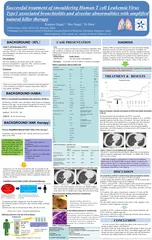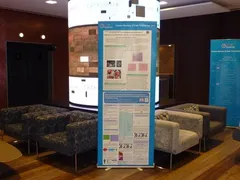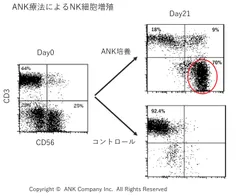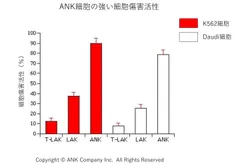ANK Immuno-Cell Therapy Demonstrates Outstanding Results Presented at the World Cancer Congress 2023 ANK Company Inc. provides culture center
リンパ球バンク株式会社
ANK Company Inc.(Head Office: Shinagawa-ku, Tokyo; CEO: Kotaro Harada), a company that promotes cancer immunotherapy using NK cells, will hold a poster session at the World Cancer Congress (July 22-24, 2023, Barcelona, Spain) at the Ebino Centro Clinic (Miyazaki, Japan). Dr. Kenjiro Nagai, M.D., Director of the Ebino Centro Clinic (Ebino City, Miyazaki Prefecture, Japan), which offers ANK autologous lymphocyte immunotherapy (ANK immuno-cell therapy), and others presented a poster session at the World Cancer Congress in Barcelona, Spain, July 22-24, 2023, to show that ANK therapy is now firmly established worldwide.
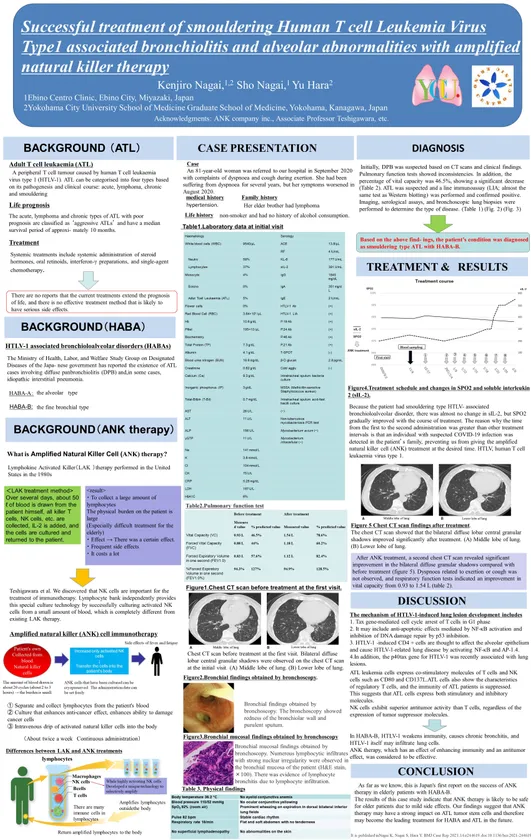
WCC 2023 Poster
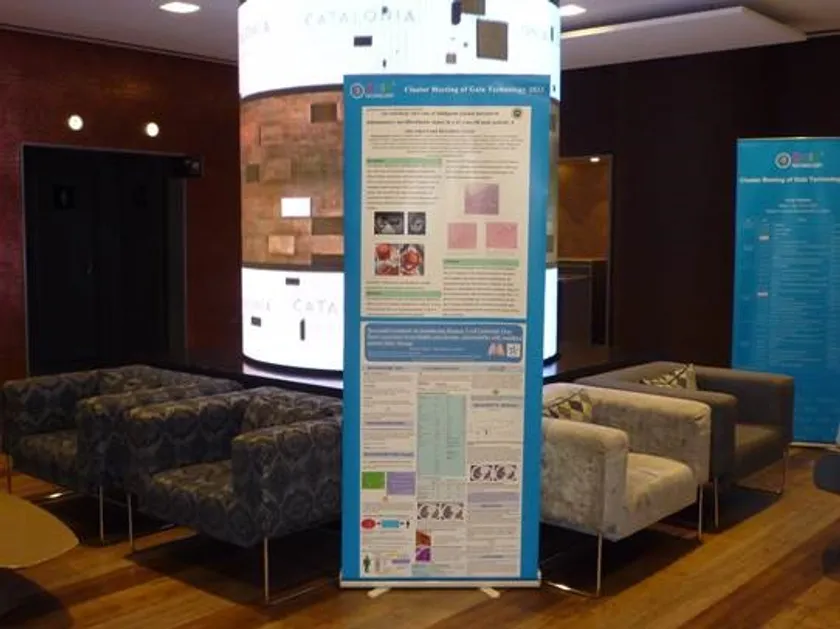
WCC 2023 venue
Successful treatment of smouldering Human T cell Leukemia Virus Type1 associated bronchiolitis and alveolar abnormalities with amplified natural killer therapy
Nagai K, Nagai S, Hara Y.
Adult T-cell leukemia/lymphoma (ATL) is a peripheral T-cell neoplasm with a poor prognosis that can present as HTLV-1-associated bronchioloalveolar disease (HABA). However, there is no effective treatment for all types of ATL or for smoldering HABA-associated ATL.
We present a case of a woman in her early 80s who was previously diagnosed with ATL-related smouldering HABA and presented with dyspnea on exertion and a productive cough, which was successfully treated with ANK immuno-cell therapy. Her disease was controlled for approximately 10 months after the first treatment, but then gradually worsened. About a year later, after the second treatment, the patient experienced mild side effects; repeated administration of ANK therapy suppressed the proliferation of ATL cells and appears to be an effective treatment for this patient. ANK therapy is expected to become a mainstay of treatment for ATL and HABA.
(Dr. Kenjiro Nagai, M.D., Director, Ebino Centro Clinic Medical Corporation)
What is ATL "adult T-cell leukemia"?
Adult T-cell leukemia (ATL) occurs in several percent of patients infected with the HTLV-1 virus during their lifetime. It is difficult to respond to anticancer drugs, and even when it does respond, it relapses immediately, with a median life expectancy of 13 months for aggressive ATL. Even in cases of repeated progression and improvement of symptoms, such as the smouldering type, the disease eventually turns acute, and the median life expectancy after acute transformation is generally about one year. Bone marrow transplantation is sometimes performed, but the side effects are so severe that elderly patients cannot be treated. On the other hand, most patients are elderly. ATL is a highly refractory disease with no established standard of care, and there are guidelines for not aggressively treating the disease until it becomes severe. Mogamulizumab has been approved for the treatment of ATL, but it is associated with severe side effects. In this regard, this research report showing that ANK immuno-cell therapy is effective in the treatment of ATL, with no strong side effects (adverse reactions), although transient fever and other symptoms may occur, and that it can be used to treat physically elderly patients, is good news for patients and virus carriers.
■ Why Immuno-Cell Therapy Cannot Treat Leukemia
In general, it is said that immuno-cell therapy cannot treate leukemia. The reason is that in the case of leukemia, cancer cells are mixed in when immune cells are collected from blood for culture. This is because the contaminated cancer cells grow during culture and there are problems in returning them to the patient. Cases in which immune cells are cultured for research purposes after cleaning and removing contaminated cancer cells or after remission from drug therapy such as mogamulizumab. There are also approved CAR-T therapies in which the immune cells are cultured after removal of contaminating cancer cells, but there is no other immuno-cell therapy other than ANK immuno-cell therapy that can treat leukemia at a clinically practical level without pretreatment.
ANK immuno-cell therapy cannot be cultured if there are too many cancer cells in the blood, but if the number of cancer cells in the blood is below a certain level, it has been reported in another paper that ATL cells in culture can be reduced to a level undetectable by PCR testing.
Teshigawara K, Nagai S, Bai G, Okubo Y, Chagan-Yasutan H, Hattori T. MDPI Reports 1(2):13, 2018. doi.10.3390/reports1020013
Case report
Successful Amplified-Natural-Killer Cell (ANK) Therapy Administered to a Patient with Smouldering Adult T-Cell Leukemia in Acute Crisis
ANK Immunotherapy
Five to eight liters of the patient's own blood is circulated extracorporeally through a device used for component blood sampling, etc., and the lymphocytes contained in the blood are selected and extracted. The NK cells in the blood are highly activated and selectively proliferated at the same time. Highly activated NK cells have a tendency to self-destruct when they divide, because they carry a large number of bomb-like endoplasmic reticulum inside their cells, which can injure cancer cells.
Therefore, it has been difficult to achieve both activation and proliferation at a level that is meaningful for clinical practice, but two researchers at Kyoto University have overcome this difficulty and named the therapy Amplified NK (ANK), which means both activity and proliferation. A patient who overcame advanced cancer with this treatment and the researchers founded Lymphocyte Bank, Inc. in 2001.
In the treatment, cultured ANK cells are returned to the body via intravenous infusion. In addition to directly damaging cancer cells without changing the function of NK cells, whose main job is to attack cancer cells, the treatment also stimulates the activation of NK cells in the body by releasing a large amount of immunostimulating substances. Most of the immunostimulants released at this time have the property of inducing fever, which causes transient adverse reactions such as chills and high fever after intravenous infusion.
FCM Classification by Immune Cell Culture Method
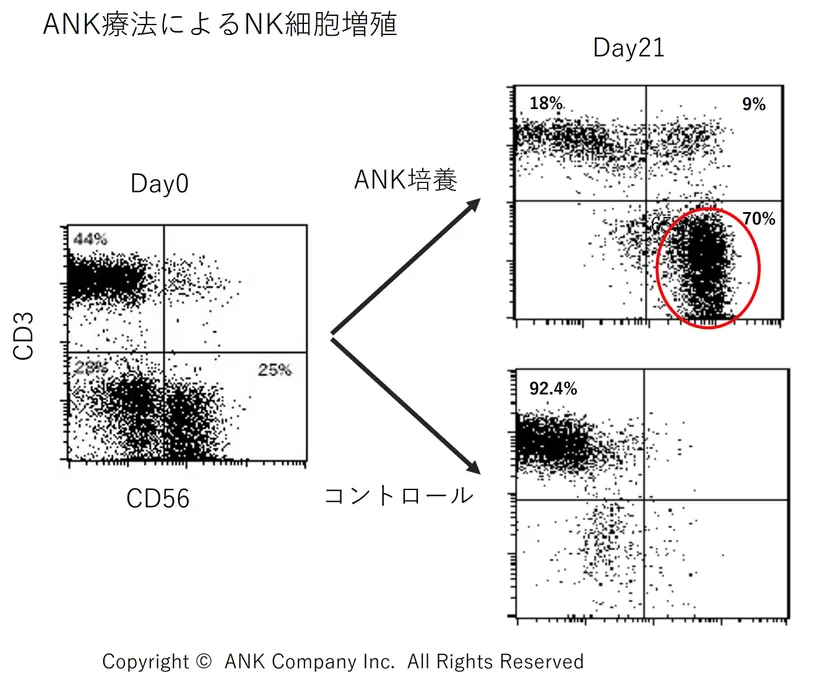
FCM Classification by Immunocyte Culture Method
Background and Characteristics of Immuno-Cell Therapy
In the 1970s, T cells, dendritic cells, macrophages, etc. were already known. As a result, a lymphocyte that can immediately attack any cancer cell it encounters if its activity is high enough was discovered and named natural killer (NK) cells. The NK cells are equipped with a large number of specialized sensors that recognize cancer cells and have strong attacking power. Today, it is known that NK cells in cancer patients are inactive, allowing cancer cells to proliferate.
The National Institutes of Health (NIH) has conducted a large-scale clinical trial of immuno-cell therapy in which NK cells are extracted from dozens of liters of blood, strongly stimulated, and then returned to the patient's body, showing some effect in several hundred cancer patients who did not respond to anticancer drugs. The culture period was limited to 3 days because highly active NK cells are prone to self-destruct as they proliferate if cultured for longer than 3 days. In addition, when large numbers of activated NK cells were returned to the body, large tumors underwent necrosis, releasing large amounts of potassium and other substances inside the tumor and posing risks such as cardiac arrest. Therefore, the treatment was conducted while occupying the ICU and controlling body fluids, which was impractical and costly, making practical application impossible.
NK cells are extremely difficult to cultivate and are only useful when their activity is increased, but once proliferation begins, they have the problem of being prone to self-destruct due to their strong aggressiveness. Two researchers at Kyoto University developed ANK autologous lymphocyte immunotherapy (ANK immuno-cell therapy) that simultaneously activates and proliferates NK cells beyond the limitations of the U.S. method, and after small clinical trials, began general practice. Because the ANK immuno-cell therapy outperforms the NIH method in both NK activity and number of NK cells, there is a risk of necrosis of large tumors if the cells are returned to the body at once. Therefore, the cultured cells were frozen and stored, and divided into 12 times for one course, and administered in divided doses twice a week in principle, while thawing and re-culturing, to ensure the safety of the treatment, which allows for outpatient treatment at a clinic. However, in the case presented in this paper, the number of cells administered per dose was half of the standard dose because the treatment was divided into half of the normal dose in consideration of the patient's condition and other factors.
Comparison of cytotoxic activity cultured by each treatment method
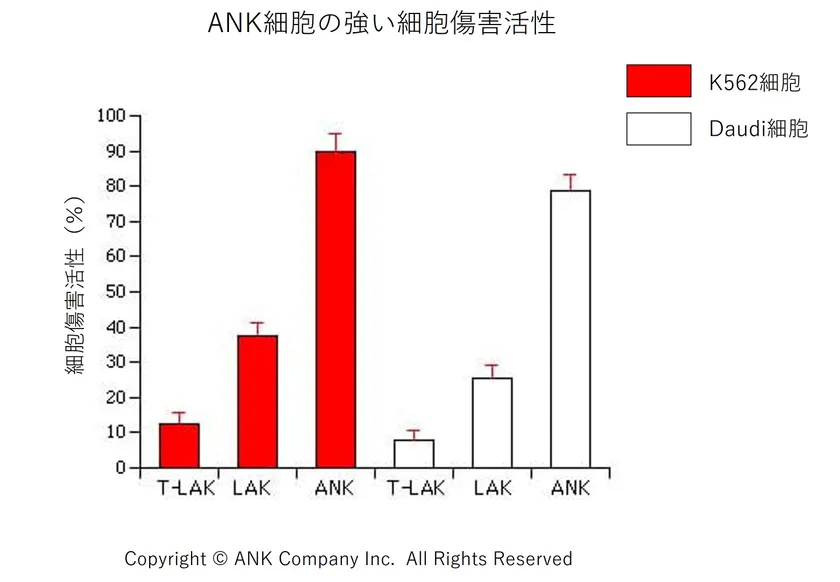
Comparison of cytotoxic activity cultured by each treatment method
The "general method" of immuno-cell therapy, which is widely used in Japan, does not cause strong immune side reactions except for a slight fever after infusion, while ANK immuno-cell therapy is accompanied by a fever of around 40°C as a result of strong immune stimulation. In recent years, CAR-T therapy with genetic modification has been approved and is covered by insurance, but the types of cancer to be treated are limited, and it is associated with severe side effects.
The prognosis is generally poor when cancer cells are dispersed in the standard treatment. The use of NK cells in cancer therapy, which track cancer cells dispersed throughout the body and kill them one by one, is considered to be key in the treatment of advanced cancers.
Outline of ANK Company Inc.
Head office: KANO Bldg. 8F, 1-25-1 Nishi-Gotanda, Shinagawa-ku, Tokyo, Japan
Representative: Keisuke Teshigahara, Chairman of the Board, and Hirotaro Harada, President and Representative Director
Capital: 67 million yen
Established: January 2001 as a Kyoto University venture
Business description: Comprehensive support service for ANK autologous lymphocyte immunotherapy
URL: https://www.lymphocyte-bank.co.jp/
Corporate Philosophy
ANK Company Inc. is a company founded and managed mainly by doctors who developed ANK immunotherapy and patients who received the therapy.
We will build a situation where treatment options are expanded for as many cancer patients as possible.
We will develop and propose treatment systems based on orthodox ideas based on scientific evidence.
We will look humbly at advanced and complex life systems, and devise ways to bring out the true potential of cells without overconfidence in cell processing and immunoregulation technologies.
By spreading awareness of the importance of immunology in the prevention and treatment of cancer, we will integrate immuno-cell therapy into the social system and expand opportunities for more patients to receive treatment.
- Category:
- Research & Reports
